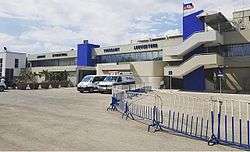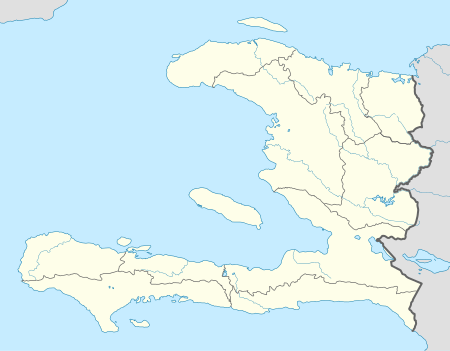Toussaint Louverture International Airport
Toussaint Louverture International Airport (French: Aéroport International Toussaint Louverture) (IATA: PAP, ICAO: MTPP) is an international airport in Tabarre, a commune of Port-au-Prince in Haiti. The airport is currently the busiest in Haiti and is an operating hub for Salsa d'Haiti, Tortug' Air, Sunrise Airways, and Haiti Aviation.
Toussaint Louverture International Airport Aéroport International Toussaint Louverture | |||||||||||
|---|---|---|---|---|---|---|---|---|---|---|---|
 | |||||||||||
 | |||||||||||
| Summary | |||||||||||
| Airport type | Public | ||||||||||
| Owner | Office National de l'Aviation Civile | ||||||||||
| Operator | Autorité Aéroportuaire Nationale | ||||||||||
| Serves | Port-au-Prince | ||||||||||
| Location | Tabarre, Port-au-Prince, Ouest, HT | ||||||||||
| Elevation AMSL | 109 ft / 33 m | ||||||||||
| Coordinates | 18°34′48″N 072°17′33″W | ||||||||||
| Website | pap.aan-haiti.com | ||||||||||
| Map | |||||||||||
 MTPP Location in Haiti | |||||||||||
| Runways | |||||||||||
| |||||||||||
| Statistics (2017) | |||||||||||
| |||||||||||
Source: | |||||||||||
History
During the 1940s, a military and civil airfield, Bowen Field, the smaller military airport in Chancerelles, not the international airport - was established near Baie de Port-au-Prince providing passenger air service by Compagnie haïtienne de transports aériens. In the 1950s and the 1960s, it served as an airbase for the US military in Haiti. Developed with grant money from the US government and mostly money collected from Haitian people (taxes, lottery, etc.), the current airport opened as François Duvalier International Airport in 1965, after the Haitian president at the time, François "Papa Doc" Duvalier.
Duvalier's son and successor, Jean-Claude Duvalier, resigned in 1986. The airport was renamed Port-au-Prince International Airport. Haitian President Jean Bertrand Aristide renamed the airport again as Toussaint Louverture International Airport in 2003 to honor Toussaint Louverture, the leader of the Haitian Revolution.
The airport was badly damaged by the 2010 Haiti earthquake. On 25 November 2012, Haitian President Michel Joseph Martelly opened the newly-repaired arrivals terminal.
Facilities
The main building of the airport works as the International Terminal. It is a two-story concrete and glass structure. Lounges and a few retail stores are on the second floor of the main building. Check-in counters, gates and immigration facilities are on the lower floor. The Guy Malary Terminal (named after former Haitian Justice Minister Guy Malary) is used for domestic flights. There are further buildings used for general aviation and cargo flights. The airport has 3 jet bridges, but most passengers walk onto aircraft from mobile stairs. The ramp area can handle 12 planes.[1]
The airport is to be re-designed completely by the year 2015. The re-making of the airport is to add 14 gates to the terminal and also will make the main passenger terminal bigger.[2] As of June 15, 2016, a taxiway is under construction to increase traffic capacity, as taxiing aircraft currently must use the active runway to taxi to their takeoff position. Work is being performed by China National Automation Control System Corporation which has multiple large construction contracts with the Haitian government.[3]
Airlines and destinations
Passenger
| Airlines | Destinations |
|---|---|
| Air Caraïbes | Paris–Orly |
| Air France | Fort-de-France, Miami, Pointe-à-Pitre |
| Air Transat | Montréal–Trudeau |
| American Airlines | Miami |
| Bahamasair | Nassau |
| Caicos Express Airways | Providenciales |
| Copa Airlines | Panama City–Tocumen |
| Eastern Airlines | New York–JFK |
| Fly All Ways | Seasonal: Curaçao, Paramaribo |
| InterCaribbean Airways | Kingston–Norman Manley, Providenciales, Santo Domingo–Las Américas |
| JetBlue | Fort Lauderdale, New York–JFK Seasonal: Boston |
| Spirit Airlines | Fort Lauderdale |
| Sunrise Airways | Camagüey, Cap-Haïtien, Curaçao, Havana, Holguín, Jérémie (starting August 10)[4] Montego Bay, Nassau, Santiago de Cuba, Santiago de los Caballeros, Santo Domingo–La Isabela, Santo Domingo–Las Americas |
| Winair | Curaçao, St. Maarten |
.jpg)
Cargo
| Airlines | Destinations |
|---|---|
| Amerijet International | Miami, Santiago de los Caballeros, Santo Domingo–Las Américas |
| DHL Aviation | Miami, San Juan |
| IBC Airways | Miami |
| Northern Air Cargo | Miami |
Access
.jpg)
The airport can be accessed by car (with parking space next to the terminal building) or by National Bus Route 1.
Accidents and incidents
- 3 March 1980: A Learjet (N211MB) operating on a corporate charter flight on behalf of 'Merchant Bank' crashed in the hills on arrival at airport. One passenger and two crew members died.[5]
- 12 July 1980: A Douglas C-47 crashed on approach, killing all three people on board. The aircraft was being used illegally to transport marijuana.[6]
- 7 December 1995: An Air St. Martin Beechcraft 1900D aircraft (F-OHRK) hit a mountain at an altitude of 5,030 feet (1,533 m), 30 kilometres (19 mi) away from airport. Two crew members and 18 passengers (which were illegal immigrants to Guadeloupe) were killed.[5]
.jpg) Terminal from the taxiway
Terminal from the taxiway - 12 February 1996: A Haiti Express GAF Nomad aircraft (N224E) crashed shortly after taking off. Two crew members and 8 passengers died.[5]
- 31 August 2007: A Caribintair Cessna Grand Caravan (HH-CAR) crashed shortly after takeoff 5 kilometres (3 mi) away from the airport. There were no fatal injuries.[5]
- 11 September 2007: Only eleven days after the previous accident another plane crash of a Caribintair Cessna Grand Caravan (HH-CAW) occurred near the airport, this time upon landing 10 kilometres (6 mi) short of the runway.[5]
- 12 January 2010: The 2010 Haiti earthquake damaged its control tower, and relief work afterwards caused a huge increase in flights.
.jpg) National Airlines cargo at PAP apron
National Airlines cargo at PAP apron - 26 May 2013: A Brazilian Air Force KC-137 transport aircraft veered off the runway after an engine fire during takeoff, crashing into the grass next to the runway. The plane was carrying 121 Brazilian soldiers deployed to the UN stabilization force in Haiti (MINUSTAH) but no injuries were reported. Small aircraft were allowed to resume flying on Monday, but large aircraft that could not pass the KC-137 (mostly to/from the USA) were suspended for days.[7]
See also
- Jacmel Airport, another airport used for 2010 earthquake relief flights in Haiti
- Operation Unified Response, US military relief effort for the January 2010 earthquake in Haiti
- List of airports in Haiti
- List of the busiest airports in the Caribbean
References
- Globe and Mail, "A once sleepy airport is now Haiti's overstretched lifeline", Paul Koring, 19 January 2010 (accessed 20 January 2010)
- Toussaint Louverture International Airport in Port-au-Prince, Haiti. YouTube. 14 November 2012. Retrieved 6 June 2015.
- "Haiti - Reconstruction : Signature of 4 agreements with a Chinese company". Haiti Libre. Retrieved 16 June 2016.
- KSZ PAP-JEE
- Harro Ranter. "Port-au-Prince-Mais Gate Airport profile - Aviation Safety Network". Retrieved 6 June 2015.
- "Accident description". Aviation Safety Network. Retrieved 3 July 2010.
- "Engine Fire And Crash of Brazilian Air Force Plane in Haiti". Haiti Observer. 27 May 2013. Retrieved 28 June 2013.
External links
![]()